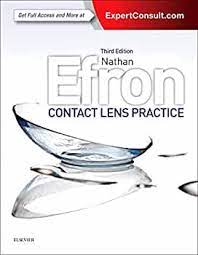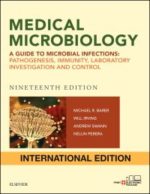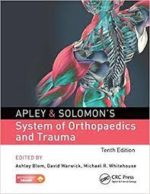In this thoroughly revised and updated third edition of Contact Lens Practice, award-winning author, researcher and lecturer, Professor Nathan Efron, provides a comprehensive, evidence-based overview of the scientific foundation and clinical applications of contact lens fitting. The text has been refreshed by the inclusion of ten new authors – a mixture of scientists and clinicians, all of whom are at the cutting edge of their specialty. The chapters are highly illustrated in full colour and subject matter is presented in a clear and logical format to allow the reader to quickly hone in the desired information.
Contact Lens Practice
KSh 29,400.00
In this thoroughly revised and updated third edition of Contact Lens Practice, award-winning author, researcher and lecturer, Professor Nathan Efron, provides a comprehensive, evidence-based overview of the scientific foundation and clinical applications of contact lens fitting. The text has been refreshed by the inclusion of ten new authors – a mixture of scientists and clinicians, all of whom are at the cutting edge of their specialty. The chapters are highly illustrated in full colour and subject matter is presented in a clear and logical format to allow the reader to quickly hone in the desired information.
Related products
-
Nelson Textbook of Pediatrics, 2-Volume Set, 21st Edition
KSh 25,200.00Nelson Textbook of Pediatrics – the reference of choice among pediatricians, pediatric residents, and others involved in the care of young patients. This fully revised edition continues to provide the breadth and depth of knowledge you expect from Nelson, while also keeping you up to date with new advances in the science and art of pediatric practice. Authoritative and reader-friendly, it delivers the information you need in a concise, easy-to-use format for everyday reference and study. From rapidly changing diagnostic and treatment protocols to new technologies to the wide range of biologic, psychologic, and social problems faced by children today, this comprehensive 2-volume reference keeps you on the cutting edge of the very best in pediatric care.
Key Features-
- Includes more than 70 new chapters, including Postural Orthostatic Tachycardia Syndrome (POTS), Rare and Undiagnosed Diseases, Approach to Mitochondrial Disorders, Electronic Nicotine Delivery Systems, Zika, update on Ebola, Epigenetics, Autoimmune Encephalitis, Global Health, Racism, Media Violence, Strategies for Health Behavior Change, Positive Parenting, and many more.
-
- Features hundreds of new figures and tables throughout for visual clarity and quick reference.
-
- Offers new and expanded information on CRISPR gene editing; LGBT health care; gun violence; vaccinations; immune treatment with CAR-T cells; new technology in imaging and genomics; new protocols in cancer, genetics, immunology, and pulmonary medicine; and much more.
-
- Provides fresh perspectives from four new associate editors: Nathan J. Blum of The Children’s Hospital of Philadelphia; Karen Wilson of Mt. Sinai School of Medicine in New York; Samir S. Shah of Cincinnati Children’s Hospital Medical Center; and Robert C. Tasker of Boston Children’s Hospital.
-
- Provides regular updates online, written exclusively for Nelson.
-
- Remains your indispensable source for definitive, evidence-based answers on every aspect of pediatric care.
-
- Enhanced eBook version included with purchase. Your enhanced eBook allows you to access all of the text, figures, and references from the book on a variety of devices.
Author InformationBy Robert M. Kliegman, MD, Professor and Chair Emeritus, Department of Pediatrics, Medical College of Wisconsin, Children’s Hospital of Wisconsin, Milwaukee, Wisconsin and Joseph St. Geme, MD, Chair, Department of Pediatrics, Professor of Pediatrics and Microbiology, Perelman School of Medicine at the University of Pennsylvania; Physician-in-Chief, Leonard and Madlyn Abramson Endowed Chair in Pediatrics, Children’s Hospital of Philadelphia, Philadelphia, Pennsylvania -
-
An Introduction to Forensic Genetics, 2nd Edition
KSh 16,198.00This is a completely revised edition of a comprehensive and popular introduction to the fast moving area of Forensic Genetics. The text begins with key concepts needed to fully appreciate the subject and moves on to examine the latest developments in the field. Now illustrated in full colour throughout, this accessible textbook includes numerous references to relevant casework. With information on the full process of DNA evidence from collection at the scene of a crime to presentation in a legal context this book provides a complete overview of the field.
Key Features:
- Greater in-depth coverage of kinship problems now covered in two separate chapters: one dealing with relationships between living individuals and the other covering identification of human remains.
- New chapter on non-human forensic genetics, including identification of bacteria and viruses, animals and plants.
-
Management Principles for Health Professionals
KSh 7,420.00Management Principles for Health Professionals is a practical guide for new or future practicing healthcare managers. The customary activities of the manager―planning, organizing, decision making, staffing, motivating, and budgeting―are succinctly defined, explained, and presented with detailed examples drawn from a variety of health care settings. Students will learn proven management concepts, techniques, models, and tools for managing individuals or teams with skill and ease.The Eighth Edition continues to present foundational principles of management in the context of contemporary health care. With timely coverage of such topics as medical cost sharing; use of robots; ER by appointment; increased use of observation units; renewed use of flextime staffing and scheduling; use of social media on the job, and more, this thoroughly updated text addresses the latest trends and issues that today’s health care manager is likely to encounter.Key Features- Presents 2 new tools ―The Manager’s Wheel Book and the Management Reference Portfolio ― to help new managers better understand their role and responsibilities and to aid existing managers in understanding their organization in detail- Covers managing care in a wide variety of health care settings (urgent care centers, specialty clinics, home care, etc.) outside of the traditional hospital setting.- Addresses technology and its impact, including eVisits/telemedicine, implementation of electronic health records, connectivity and the expectation that workers will respond during off hours via email and instant messaging, etc. – Offers expanded coverage on the importance and impact of corporate culture, the values of transparency and accountability, leadership style, and competitiveness.- Includes detailed examples of reports, plans, directives, union contracts, and more.
-
Medical Microbiology, International Edition, 19th Edition
KSh 7,462.00Medical microbiology concerns the nature, distribution and activities of microbes and their impact on health and wellbeing. In spite of the introduction of many antimicrobial agents and immunisations, we continue to face major challenges in combatting infection, not least the gathering crisis in antimicrobial resistance.
Now in a fully revised and updated 19th edition, Medical Microbiology provides comprehensive coverage of infection from the microbial perspective, combining a clear introduction to key principles with a focus explicitly geared to modern clinical practice. It provides ideal coverage for medical and biomedical students – with ‘Key Points’ boxes throughout to highlight the essentials – and sufficient detail to also inform specialists in training.
Building on the success of previous editions, updates in Medical Microbiology 19e include:
-
- New and expanded coverage of hot topics and emerging areas important to clinical practice, including:
-
-
- Genomics
-
-
-
- The Human Microbiome
-
-
-
- Direct acting antiviral agents for the treatment of HCV infection
-
-
-
- Molecular methods in diagnostic microbiology
-
-
-
- Antibiotic Stewardship
-
-
- BONUS electronic materials to enhance your learning, including:
-
-
- Clinical cases – to introduce how patients with infections present and help relate key principles to practice
-
-
- MCQs for each chapter – to check understanding and aid exam preparation
-
-
Pocket Tutor Orthopaedics
KSh 5,500.00Titles in the Pocket Tutor series give practical guidance on subjects that medical students and foundation doctors need help with “on the go”, at a highly affordable price that puts them within reach of those rotating through modular courses or working on attachment.
- Common investigations (ECG, imaging, etc)
- Clinical skills (patient examination, etc.)
- Clinical specialties that students perceive as too small to merit a textbook (psychiatry, renal medicine)
Key points
- Practical, accessible introduction to a subject that students find daunting, but which juniors will encounter as part of orthopaedic and emergency rotations
- Logical, sequential content: relevant basic science; then chapters devoted to the clinical essentials of orthopaedics and the disorders and injuries seen most commonly in practice
- Descriptions of common disorders are enhanced by Clinical Scenarios (Patient presents with…), which help students and trainees to recognise and manage common presenting problems
-
Children with Developmental Disabilities: A Training Guide for Parents, Teachers and Caregivers First Edition
KSh 6,370.00This manual is designed as a guide for parents, teachers and caregivers dealing with children up to the age of six who are afflicted by developmental disabilities. The author provides details of more than 400 non-formal activities along with guidelines on how to use them both at home and in pre-school settings.
The book is divided into three sections:
– the first describes a wide range of impairments, disabilities and handicaps along with information on their manifestations and characteristics. The author also outlines steps to handle negative or problem behaviour during training.
– the next section presents a Comprehensive Activity Checklist for pre-school children. All items have been empirically tested and are located on a scale of increasing difficulty.
– the third section comprises two chapters. The first is a `do-it-yourself` activity assistance guide which will be of immense use to trainers, caregivers, teachers and parents. In the last chapter, Dr Venkatesan discusses contemporary problems and issues related to the rights and privileges of persons with developmental disabilities -
The Great Influenza: The Story of the Deadliest Pandemic in History -Paperback
KSh 650.00Magisterial in its breadth of perspective and depth of research, The Great Influenza provides us with a precise and sobering model as we confront the epidemics looming on our own horizon. As Barry concludes, “The final lesson of 1918, a simple one yet one most difficult to execute, is that…those in authority must retain the public’s trust. The way to do that is to distort nothing, to put the best face on nothing, to try to manipulate no one. Lincoln said that first, and best. A leader must make whatever horror exists concrete. Only then will people be able to break it apart.”
At the height of World War I, history’s most lethal influenza virus erupted in an army camp in Kansas, moved east with American troops, then exploded, killing as many as 100 million people worldwide. It killed more people in twenty-four months than AIDS killed in twenty-four years, more in a year than the Black Death killed in a century. But this was not the Middle Ages, and 1918 marked the first collision of science and epidemic disease.










Be the first to review “Contact Lens Practice”